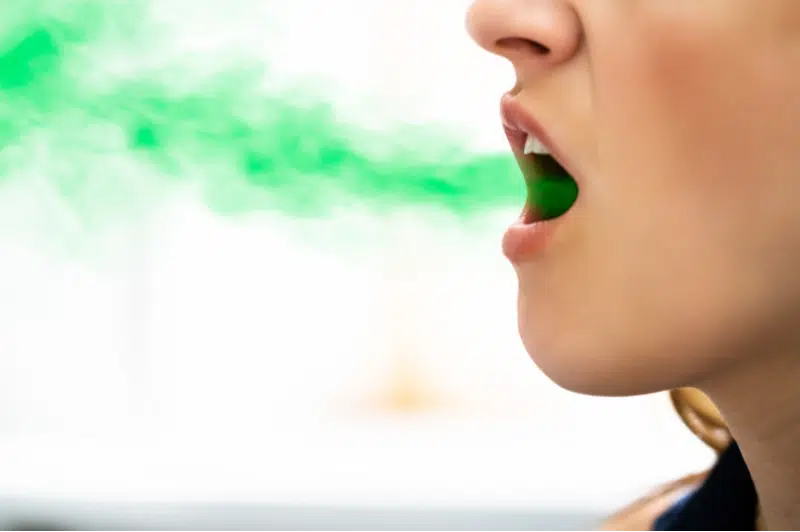Bad breath, scientifically known as halitosis, is a common issue that affects millions of people worldwide. While many of us reach for mouthwash or mints for a quick fix, these solutions often mask the problem rather than addressing its root cause. However, what if there was a more effective, long-term solution? Recent research suggests that probiotics, typically associated with gut health, might be the key to fresher breath.
The Probiotic Promise
See our earlier blog post: Exploring the Potential of Probiotics: A Comprehensive Guide
As we’ve discussed in our previous article on oral health, the balance of bacteria in our mouths plays a crucial role in overall oral hygiene. Now, newly emerging studies are shining a light on how probiotics might tip this balance in our favor when it comes to combating bad breath.
Understanding the Research
A recent article by BIOptimizers explores this fascinating connection between probiotics and halitosis. Here are the key takeaways:
- First, traditional methods like mouthwashes and regular brushing may not address the root cause of bad breath.
- Moreover, probiotics, known for their gut health benefits, show promise in maintaining a healthier, fresher mouth.
- Finally, the science behind this approach involves introducing beneficial bacteria that can potentially outcompete the odor-causing bacteria.
My Take on the Matter
As someone who has been researching oral health for years, I find this development particularly exciting. Here’s how it appears to work:
1. Balancing the Oral Microbiome
Our mouths are home to a complex ecosystem of bacteria. However, when this balance is disrupted, certain bacteria can produce foul-smelling compounds. Fortunately, probiotics can help restore this balance by introducing beneficial bacteria.
2. Reducing Volatile Sulfur Compounds (VSCs)
VSCs are the primary culprits behind bad breath. In fact, probiotics may help reduce the production of these compounds by competing with the bacteria that produce them.
3. Supporting Overall Oral Health
Additionally, a healthy oral microbiome can contribute to overall oral health, reducing the risk of gum disease and other conditions that can contribute to bad breath.
A Word of Caution
It’s important to note that, while probiotics show promise, they’re not a cure-all. For instance, bad breath can sometimes be a symptom of more serious health conditions. As the BIOptimizers article rightly points out, it’s crucial to consult with a dentist or physician to rule out any underlying issues before trying alternative solutions.
Incorporating Probiotics into Your Oral Health Routine
If you’re interested in trying probiotics for bad breath, here are a few practical steps to help you get started:
- Choose the Right Probiotic:
- First, look for specific strains: Research shows that certain strains, like Lactobacillus salivarius, are particularly effective for oral health and bad breath.
- Additionally, consider the number of colony-forming units (CFUs): A higher CFU count generally indicates a more potent probiotic.
- Finally, check for expiration: Ensure the probiotic is fresh and has not expired.
- Consult a Healthcare Professional:
- Personalized advice: A healthcare provider can recommend the best probiotic for your specific needs and any underlying health conditions.
- Consider the Form:
- Supplements: Probiotic supplements are widely available in capsule, tablet, or powder form.
- Foods: Certain foods, like yogurt, kefir, and fermented vegetables, naturally contain probiotics.
- Timing:
- With meals: Taking probiotics with meals can help them reach the digestive tract more effectively.
- Consistency: For optimal results, take probiotics consistently.
- Storage:
- Refrigeration: Some probiotics require refrigeration to maintain potency. Check the product label for specific instructions.
- Monitor for Side Effects:
- Rare but possible: While side effects are rare, some individuals may experience bloating, gas, or diarrhea. If these symptoms persist, discontinue use and consult a healthcare provider.
- Combine with Good Oral Hygiene:
- Complementary: Probiotics work best when combined with regular brushing, flossing, and tongue scraping.
Remember: While probiotics can be a helpful addition to your oral health routine, they are not a substitute for proper dental care. Always consult with your dentist or healthcare provider for personalized recommendations.
Conclusion
In conclusion, the potential of probiotics in fighting bad breath opens up exciting possibilities for oral health care. As research in this area continues to evolve, we may see more targeted probiotic solutions for various oral health issues.
For those interested in diving deeper into this topic, you can read more about probiotics and bad breath on BIOptimizers’ blog. Their article provides additional insights into the science behind this promising approach.
Create an account and use code SAVE10 at checkout for 10% off your order.




